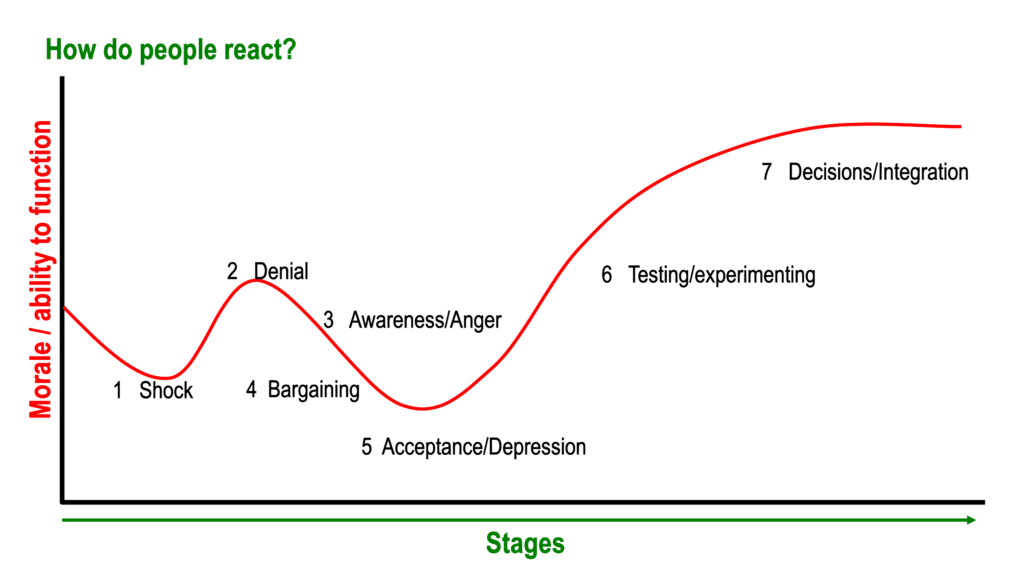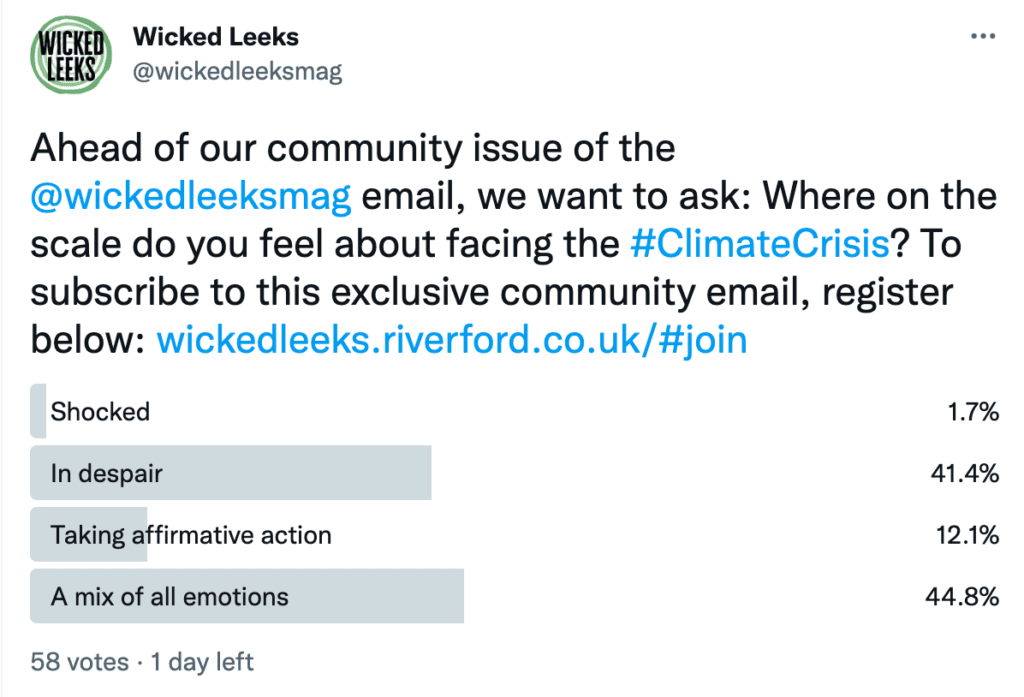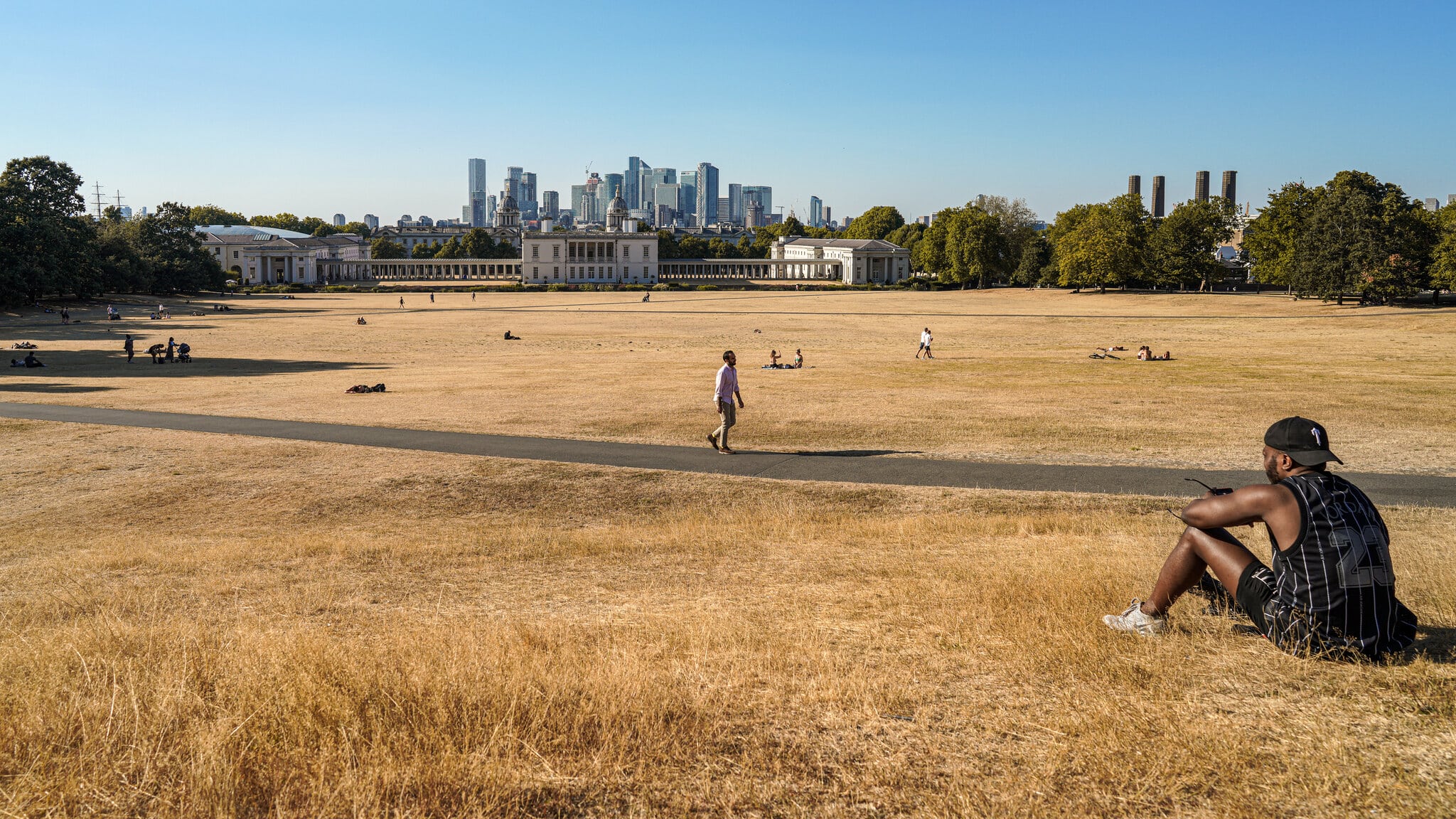“Why is it that vast swathes of humans seem not to believe in or care about the climate crisis? How can I manage my own distress when my arguments are met with indifference or hostility?”
I hear this a lot. And I feel it, too.
The reality is that at any one point in time, people fall within a range from risking everything and investing anything to halt climate change, to those doing the opposite and trying to deny it’s happening. In the middle are those who are confused, conflicted or just trying their best to do the right thing.
I spend most of my time somewhere in the middle, oscillating between ‘why bother when nothing I do or say can make a difference’ and ‘what more can I risk or invest to make a positive difference?’
Where are you right now?
I am a leadership coach and change mentor for those working to make the world a better place. It has never felt so urgent for me to share my understanding of change. I believe that if enough of us apply the fundamentals of how humans react and are persuaded to change, mass movement is possible.
What is most effective? To apply as much pressure as possible to those who appear immune to change, or to gently encourage those on the tipping point? To risk your relationship with that family member who appears to take delight in countering your arguments, or to seek out people who will quietly listen to what you have to say?
A movement needs a critical mass of people. The growing scientific consensus and individuals experiencing climate change are persuading more of us to change. But it needs to happen faster. People ready for change need motivation, support and practical advice to get them there, and to take others with them.
The ‘rollercoaster of change’ helps us to understand what we are going through, that it’s normal, and that neither ‘we’ nor ‘they’ are bad people. It can help us empathise with others, understanding where they are on their journey and what they might need.
Why do we experience change as a rollercoaster?

When you hear news about climate change and its implications, what is your first reaction? For many, it is shock. The more unpalatable the information, the greater the sense of shock.
Then denial. For some, it may be a fleeting ‘surely that can’t be the case?’ For others, it is a comfortable place to stay, for as long as change can be avoided.
Then bargaining. ‘If I do this, then the change won’t happen. I can recycle, avoid plastics, buy organic, an electric vehicle, solar panels…’
Further proof still leads us to accept that not only is change is happening, but it is inevitable. There appears to be little we can do about it. It can be a depressing time.
The next stage is testing or experimenting. If change is inevitable, then what can I do about it?
Finally, you take decisions and adapt to the change so that it becomes the way you live your life.
But the rollercoaster goes in both directions. Just as you start the climb out of one valley, say depression, something happens that sends you right back again to anger or denial of shock.
It is a very personal rollercoaster. Everyone experiences it differently.
Where you are on the rollercoaster? Where are the people you are talking to about climate change and what might they need? Do share your thoughts and experiences, as we need to recognise that these are all normal.

This article is part of the Wicked Leeks community email, subscribe here to receive next month’s issue featuring the next part of this series: ‘It could be beautiful: How can we create a positive vision of change?’














Seems you want to know how I feel about that great myth – Climate Change – try disbelieve that yet again there are those self imprtant people who want to control how we live, couple that with boredom due to overkill by the same people – lets face it nobody is going to come out of this alive so why not go out in blaze of glory! If that’s the way of it?
Love to hear your reactions to that – no maybe not you might think I’m interested! My main concern actually is living well until the “book” is opened to the day my flight is due to depart – come with me it will be fun!
The Walrus
Thank you, Walrus. I appreciate your comments and hope you don’t mind me using them as an illustration of the rollercoaster and how difficult it can be to identify where someone might be, or indeed to identify with their choices. Regards, Jacqueline
With respect, your answer speaks to the place of division between humans. The crises that face us require humanity to come together & live the truth that we are one, one human race which is also one with all nature & planet earth. If something is not right with one part of me, I do whatever I can to fix & heal it. So too we must come together as one to fix the plants, animals & the earth itself, so that our children & our children’s children can live& be sustained as nature as intended.
Picking up on the section of the article about how people react to conversations about climate change, and the many ways in which we might interpret them: An immediate interpretation might be to assume the other person is at the ‘denial’ stage – but denial of what? Climate change? It’s potential implications? That we can do anything about it? Perhaps we are looking at ‘anger’, however we can only second-guess the emotions in another person. Depression/acceptance? Maybe. People express this in many different ways. Another option is that following an acceptance that there are no solutions, or none that are acceptable, the person you are in conversation with may have decided that the only way to integrate the change into their life is to decide to live well until the inevitable happens. The fortunate have choices – if only for a limited period of time.
Jacqueline, with reference to the above please do by all means – please note that whilst the above was written in a jocular manner my actual meaning is, I hope, on display . . . . . . mainly that whilst concerned about the environment there seems to be a lot of overkill in the presentation of the subject to the extent of “putting the innocent passerby” into a state of disinterest – with the way the world is at the moment most of us have many other things, more important to us, than the suspected disappearance of the world in some undefined timing – there seems to be a media attitude towards displaying nothing but “Doom and Gloom” when the majority need cheering up about the whole thing! e.g. we’ve all been through Y2K where everything was supposed to close down at the change of the Century – nothing happened at all then . . . . I wish you luck in your endeavour, I sincerly do, just not here and not now!
Walrus – thank you again. You’ve hit the proverbial nail on its head; twice. How can anyone think about a threat that appears far away when faced with more immediate concerns? Human reactions depend upon how immediate the personal threat of climate change appears to be. For some it is no longer a threat but a reality. The next article in this series will look at the second point. Why would anyone choose to engage with a future that is so depressing?
SuzanneRosemary
Whilst I respect and to a certain extent agree with your view to my mind you seem to have picked up that most dangerous of habits where
“If something is not right with one part of me, I do whatever I can to fix & heal it. So too we must come together as one to fix the plants, animals & the earth itself, so that our children & our children’s children can live & be sustained as nature intended.”
In that you seem to think that “we” as humans must come together as one to FIX the PLANTS, ANIMALS AND THE EARTH ITSELF SO THAT OUR CHILDREN etc. But is this not setting ourselves up as GODS in that We must FIX, NOT the animals or the plants etc to fix their own problems – there again apart from a few small problems I don’t think the animals and plants need much fixing – however I cannot see the lions lying down with the deer for a few years yet, not at least until the lions become “vegan” and even then might not the plants complain?
Having said that I certainly agree that WE as ‘umans must do something about the pollution we have caused (and anything that stems from that) BUT NOTHING ELSE which really is not our problem. Lets face it the climate in all it’s glory changes frequently – Remember when climate Chan/Global Warming came around this time we were told that the Maldives and the Seychelles would have disappeared beneath the waves by now but they are still there, with the Maldives, which have never been very far above sea level, now a couple of inches higher? Our fault? But surely not, we are the bogeymen sinking everything are we not?
Ok, you’ve got me. Applying black & white logic to my point you are correct. I was expressing myself a little loosely by saying animals & plants need fixing. Of course they don’t in themselves. They do need our help to thrive again though, because we have stolen their habitats, interfered with nature’s delicate balance, poisoned parts of the earth & the oceans & generally trashed big swathes of our habitat, like a spoilt child demanding immediate gratification. The earth is our home & she sustains us, which is what I mean by unity & connection. Everything we do affects something else, as if we are one organism, therefore, if we are to leave a healthy or at the very least a recovering planet, for future generations we are seriously running out of time. Help is needed now & if we are honest & intentional about giving that help, it is going to be very hard because everything will need to change, from the way we live & produce food & clothing, to how & how much we travel, to how we are governed & how world economies function & that’s probably just the tip of the iceberg. Whether or not the Maldives are under water is neither here nor there when it is clear so many places in the world are already suffering from flooding, drought, storms & wildfires. And yes, these things have always happened but its obvious that they are happening with much more frequency than ever before in human history. Also problematic is our own health which is deteriorating as a result of wholesale use of pesticides, assorted dangerous chemicals, gene therapy & hormones in food production. Our own bodies are succumbing large scale to obesity, diabetes, cancers, heart disease & vascular diseases. The future is very bleak unless we take action together.
Our first task, I believe, is to rid ourselves of the tyranny of big money & the power that wealds over our governments & daily lives. There is little integrity left in business & politics & that must change if we & nature are to become healthy once more.
SuzanneRosemary
Funnily enough I think in a way both sides of the argument are right in as far as they go. In the first part as I said a lot of this either has happened before with little effect, but happened it has or it happens occasionally witha greater effect – but is part of natures way of sorting things out [yes nature is as you say the great leveller – she will, given time return to the way she was but also as you say maybe the world is running out of that important commodity – time – but is it? Only Time [he he he] will tell! To a certain extent your view comes [to my mind] as a “knee jerk reaction” which within reason is a fairly sensible way to go and most would agree to that however in this process I am minded of the often knee Jerk reaction to certain “criminal actions” that occur in our lifestyle (the bad ones that begger belief – I’m sure I don’t need to spell them out. But when we go to change the law we often find that there is, already in place actions that if policed correctly would have stopped the action before it even began.
To carry out the majority of the so called required actions to return the world to what was once considered good we should then return to a time when things where actually (apparently) good – but when was that and what would we lose in the process? Personally I would go back some 150 years with no thought whatsoever including such beautiful things as using whale oil for the only decent lighting system we had until then . . . . . . hell did he say whale oil lamps? Kill all those wonderful whales just so we can see to make nice clothes stitching by hand to earn but a few pennies to feed the whole family – actually looking at it we are on the way already! So best we go back further, but when do we stop? Maybe before Humans managed to get out of the trees? Are we taking on too much expecting to be able to do that? Just a point but have you noticed, no probably not, but soldiers can be quickly trained to go and and kill and destroy – but nobody has as yet managed to untrain the soldier so that when peace comes he is cured and can return to the way his [or her] life was before the war! Surely they too deserve to learn the ways of peace? If only to ensure it doesn’t happen again!
Finally and something I do most certainly agree with you, I quote: –
“Our first task, I believe, is to rid ourselves of the tyranny of big money & the power that wealds over our governments & daily lives. There is little integrity left in business & politics & that must change if we & nature are to become healthy once more.” That MUST BE ACCOMPLISHED ABOVE ALL OTHERS to give anybody and everybody and everything a chance to do what is good for all concerned in as much as they want or not as the case maybe!
Walrus seems to have some knowledge of the opinions of bible writers as to how the earth was to progress and what was to happen. I hold that loosely but what I also read is that God loves the earth. I ought to as well. Some may deny we are in climate chaos, but I choose to live with as ‘light a footprint’ as possible and don’t look at it as ‘control’. Using denial as a reason to just continue living in an extravagant, wasteful way wouldn’t be an option for me.
Anthony Roper
Thanks for you observation if a little warped about me, so glad to know those exciting things about me! I am so glad your God loves the Earth – without which he would be only a minor god of little consequence, in some ways mine do too as they are aware of the things of which you speak – they’ve been around a wee bit longer than your middle eastern fellah – Middle Eastern Gods for the Middle East – Northern European Gods for Northern Europe – seems more sensible to me than having gods who just don’t know their people but that’s beside the point.
As for treading lightly – but of course, but please admit that if given the chance to continue living in such an extravigant way (presumably the way that you have lived so far in your life) you would not do so. Therefore please continue wearing your “hair shirt” and eating only simple foods of your desire, controlling your live the way YOU wish to control YOUR life and let the rest of us do the same – Remember, please that telling somebody else how to act, live and eat is “CONTROL” no matter how you look at it – thank you and goodnight – pleasant dreams about being controlled – sadly maybe one day you will be controlled properly, but plese be warned it may not be the way you wish it.
Last year there were two scape goats in our midst – Covid and Climate Change; now we only have the latter it seems. There is now customer fatigue when it is (so often) mentioned in the media. Blaming us all the time.
There have always been changes in climate and there always will be. The Sun and Earth are in dynamic equilibrium and when the Sun sneezes, the Earth gets a cold: the Sun is the main mover in climate change.
Better to plan for it rather than believe we are God and can change the way the universe works, but at the same time get rid of the massive chemical pollution which goes on; respect the natural world; stop unnecessary tree felling; rely less on communication which requires us to be bombarded with e.m. radiation whether we like it or not.
Just my opinion!
Baffled – seems as if a bunch of Trolls have taken over this comments section.
Last place we need this sort of Tommy rot.
???
I move between feeling despair (and even more despair at human apathy) to being resigned that humans will be extinct sooner than we thought. So in the meantime, I think we have a responsibility not to drag down all other species with us in our race for self-destruction. And then the next day, I wake up and think that we must fix this in that most hopeful of human ways but, of course, also recognise that it’s wholly arrogant to think we can fix this mess. We can at least have a go and find purpose on this planet while we do so…
I think I’ve just danced along the curve of your graph several times in my statement!
Dear Max,
Thank you for your lovely illustration of the curve and to have described it as a dance! Different tempos, different directions and often experiencing more than one curve at a time. Just when we thought we’d sorted our reactions to David Attenborough’s documentary about plastics, he hits us with “Frozen Planet 2”. I personally have had to follow that with an episode of “Ghosts” just so I can sleep at night.
Regards
Jacqueline
I watched Frozen Planet followed by a documentary with Simon Reeve in the Brazilian patanal, and thought exactly the same thing – god this is so depressing. At that point of low key despair I felt like I needed something different, for my own wellbeing, and switched it off. How do we strike the balance between information and knowing about/even working professionally on an issue with our own emotions? Sometimes it can feel like self-flagellation.
There are a number of coaches and therapists offering affordable support to people who are working towards positive social impact. I belong to various networks including the Climate Coaching Alliance and BACP’s Coaching for Social Impact and I am also aware of coaches with links to specific activist organisations. However, I believe that one of the main issues getting in the way of moving on from “acceptance/depression” is the absence of a positive and compelling vision of the future. At the moment the narrative is primarily “if we don’t do x then bad things will happen”. I’d like to see more “if we do x then great things could happen”. More on this in the next article.